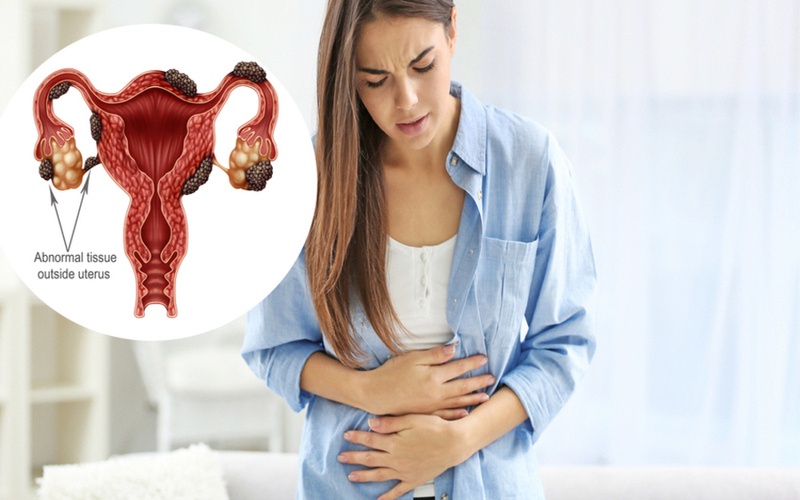Endometriosis is a painful condition affecting millions of women worldwide. However, despite being common, endometriosis can often be misunderstood or overlooked, leading to late diagnosis and treatment. But you should know it is easier to understand endometriosis than it was before. With awareness and understanding, you can also plan for a healthy life and effective treatment. Thus, to keep you informed on this taboo topic, we are back with this blog after being in conversation with Dr. Chaitali Mahajan Trivedi, who is better known as the best doctor for endometriosis treatment in Mumbai. So, let’s start by shedding light on endometriosis in detail.
What Is Endometriosis?
Endometriosis is a health condition where a tissue similar to the lining of your uterus grows outside of it. The tissue that grows outside the uterus in endometriosis is not identified to be the same as endometrial tissue, but they have some features in common.
The tissue can develop anywhere in the body, but it usually affects the pelvic area, including:
- Ovaries
- Fallopian tubes
- Outside of the uterus
- Tissues that support the uterus
However, endometriosis can also develop in other areas, including the digestive tract, lungs, and heart.
Symptoms of Endometriosis
The most observed symptoms of endometriosis are:
- Pain during sex
- Fatigue
- Nausea and vomiting
- Facing difficulty in getting pregnant
- Heavy menstrual bleeding
- Periods lasting longer than 7 days
- Long-term lower back and pelvic pain
- Painful cramping similar to menstrual cramps
- Bowel and urinary problems, including pain, diarrhea, constipation and bloating
- Blood in the stool or urine
What Are The Causes of Endometriosis?
Common causes of endometriosis are:
- Retrograde Menstruation: Endometriosis occurs when menstrual blood carrying endometrial cells flows backward into the pelvic cavity through the fallopian tubes. These cells attach to pelvic walls and organs, growing and bleeding with each menstrual cycle.
- Surgical Scar Implantation: After a hysterectomy or C-section, endometrial cells might stick to the surgical cut, leading to endometriosis.
- Embryonic Cell Transformation: Embryonic cells are present in early development. With increased estrogen during puberty, these cells can transform into endometrial-like implants.
- Transformation of Peritoneal Cells: Peritoneal cells inside the abdomen can become similar to endometrial cells due to factors such as hormones and the immune system.
- Endometrial Cell Transport: Blood vessels or lymphatic fluid can carry endometrial cells to different body parts.
- Immune System Disorder: Immune system issues can prevent the body from recognizing and removing endometrial-like tissue growing outside the uterus.
How Is Endometriosis Diagnosed?
To diagnose endometriosis, your doctor will ask you to describe the symptoms, the location of the pain, and when it occurs. In the end, the final decision is based on the following:
-
Pelvic Exam: This is performed manually by palpating the areas in the pelvis to check for cysts forming on reproductive organs or scars behind the uterus.
-
Ultrasound: It uses sound waves to create internal images. It can help diagnose endometriosis by capturing images with a transducer on the abdomen or in the vagina. While it can’t confirm endometriosis, it can detect related cysts.
-
MRI: Uses magnetic fields and radio waves to create detailed images of organs and tissues. It provides precise details on the location and size of endometrial implants for surgeons.
-
Laparoscopy: A minimally invasive procedure to check for endometrial tissue outside the uterus. A small incision near the navel allows the insertion of a laparoscope to assess tissue location and size under anaesthesia, with possible biopsy.
What Are The Treatment Options For Endometriosis?
Treatment options can vary depending on the severity of endometriosis and your preference. The treatment options you can get are:
-
Pain Medication: In the initial stage, your doctor may recommend taking pain relievers like non-steroidal anti-inflammatory drugs to ease painful menstrual cramps.
-
Hormonal Therapy: changes during the menstrual cycle thicken, break down, and cause bleeding in endometrial implants. Additional hormones can slow tissue growth, prevent new implants, and ease pain. However, this treatment isn’t permanent for endometriosis.
-
Hormonal Contraceptives: Birth control methods like pills, patches, and rings help regulate hormones that lead to monthly endometrial tissue build-up. They can also make periods lighter and shorter.
-
Gonadotropin-Releasing Hormone Agonists & Antagonists: These drugs lower estrogen and slow down endometrial growth. They may cause menopausal symptoms but can be managed with added hormones.
-
Hysterectomy With Removal of Ovaries: Surgery to remove the uterus and ovaries used to be common for endometriosis, but specialists now avoid it due to risks like early menopause and ongoing symptoms from remaining cells. Hysterectomy may help with severe symptoms, but it’s not always recommended.
-
Fertility Treatment: Endometriosis affects your reproductive health and may lead to infertility. However, by opting for In-vitro Fertilization (IVF), you can plan your pregnancy.
-
Aromatase Inhibitors: This method helps in reducing the amount of estrogen in the body. Your doctor may recommend an aromatase inhibitor along with progestin or a combination of hormonal contraceptives.
-
Conservative Surgery: Women who wish to get pregnant in future may increase their chances by getting endometriosis implants removed and conserving their uterus and ovaries.
Final Words
Having endometriosis can make you experience chronic pain, heavy periods, and complications in getting pregnant. However, you can manage your symptoms and still plan for a healthy pregnancy; you only need to consult a gynaecologist.
If you are searching for one, you can end your research with Dr. Chaitali Mahajan Trivedi. She is better known as the best Gynaecologist in Mumbai. With over 25 years of experience, she has helped thousands of women lead healthy lives. So, take a step lead and book your appointment with her by visiting Nanvati Superspeciality Hospital.


No comments yet